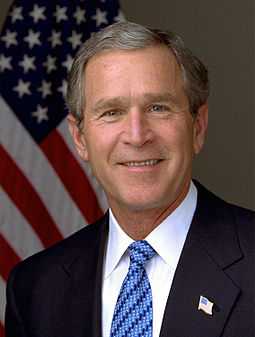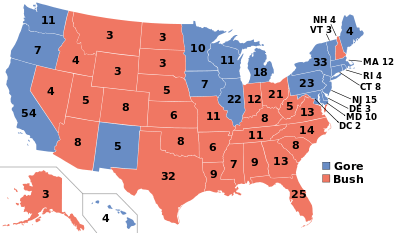United States presidential election in Kansas, 2000
| | |||||||||||||||||||||||||||||||||||||||
| |||||||||||||||||||||||||||||||||||||||
| |||||||||||||||||||||||||||||||||||||||
|
| |||||||||||||||||||||||||||||||||||||||
| County Results
Gore—60-70%
Gore—<50%
Bush—<50%
Bush—50-60%
Bush—60-70%
Bush—70-80%
Bush—80-90% | |||||||||||||||||||||||||||||||||||||||
| |||||||||||||||||||||||||||||||||||||||
| Elections in Kansas |
|---|
 |
|
Ballot measures
|
The 2000 United States presidential election in Kansas took place on November 7, 2000 throughout all 50 states and D.C., which was part of the 2000 United States presidential election. Voters chose 6 representatives, or electors to the Electoral College, who voted for President and Vice President.
Kansas was won by Governor George W. Bush. He won all of the congressional districts and counties in the state, except for Douglas County and Wyandotte County. Gore won Douglas with just 45.8% of the vote. Nader also had his best performance by far in Douglas, where he got over 10% of the vote. Bush performed very well in the first district, which is the western and most rural part of the state.
Results
| United States presidential election in Kansas, 2000 | |||||
|---|---|---|---|---|---|
| Party | Candidate | Votes | Percentage | Electoral votes | |
| Republican | George W. Bush | 622,332 | 58.0% | 6 | |
| Democratic | Al Gore | 399,276 | 37.2% | 0 | |
| Green Party | Ralph Nader | 36,086 | 3.4% | 0 | |
| Reform | Patrick Buchanan | 7,370 | 0.7% | 0 | |
| Libertarian | Harry Browne | 4,525 | 0.4% | 0 | |
| Natural Law | John Hagelin | 1,373 | 0.1% | 0 | |
| Independent | Howard Phillips | 1,254 | 0.1% | 0 | |
| Totals | — | 100.00% | 6 | ||
| Voter turnout (Voting age/registered) | 54%/66% | ||||
By congressional district
Bush won all four congressional districts.[1]
| District | Bush | Gore | Representative |
|---|---|---|---|
| 1st | 67% | 29% | Jerry Moran |
| 2nd | 54% | 41% | Jim Ryun |
| 3rd | 53% | 42% | Dennis Moore |
| 4th | 59% | 37% | Todd Tiahrt |
Electors
Technically the voters of Kansas cast their ballots for electors: representatives to the Electoral College. Kansas is allocated 6 electors because it has 4 congressional districts and 2 senators. All candidates who appear on the ballot or qualify to receive write-in votes must submit a list of 6 electors, who pledge to vote for their candidate and his or her running mate. Whoever wins the majority of votes in the state is awarded all 6 electoral votes. Their chosen electors then vote for President and Vice President. Although electors are pledged to their candidate and running mate, they are not obligated to vote for them. An elector who votes for someone other than his or her candidate is known as a faithless elector.
The electors of each state and the District of Columbia met on December 18, 2000[2] to cast their votes for President and Vice President. The Electoral College itself never meets as one body. Instead the electors from each state and the District of Columbia met in their respective capitols.
The following were the members of the Electoral College from the state. All were pledged to and voted for George W. Bush and Dick Cheney:[3]
- Shari Caywood
- Gene Eastin
- Richard Eckert
- Susan Estes
- Mark Heitz
- Charles Hostetler
References
| ||||||||||||||||||||



